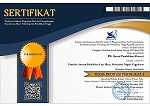PEMILIHAN KARIER BERDASARKAN GAYA BELAJAR MODEL "KOLB" PADA SISWA CERDAS ISTIMEWA KELAS 12 CERDAS ISTIMEWA BAKAT ISTIMEWA SMAN 1 WONOSARI
Downloads
Downloads
Arikunto, S. (2010). Prosedur Penelitian Suatu Pendekatan Praktek. Jakarta: Rineka Cipta.
Chin, W.S.& Rasdi, R.M. (2013). Protean Career Development: Exploring the Individuals, Organizational and Job-related Factors. Canadian Center of Science and Education.Vol. 10,No. 21
Hanifan,Akbar.(2010). Kecenderungan Pemilihan Karier Berdasarkan GayaBelajar Pada Siswa SMA Kelas XII. Fakultas Psikologi Universitas Sumatra Utara
Holland, J.L. (1985). Making Vocational Choice: A Theory ofVocational Personalities and Work Environments. Prentice-Hall, Inc. Enslewood Cliff, NewJersey.
Holland, J. L. (1997).Making vocationalchoices.U.S.A.: Psychological Assessment Resources, Inc.
Miller, K., & Cummings, G. (2009). Gifted and Talented Students' Career Aspirations and Influences: A Systematic Review of the Literature.Vol.6,Issue1 2009 Article 8. International Journal of Nursing Education Scholarship
Kolb, D. A. (1984).Experiential Learning:Experience as the Source of Learning and Development (Vol.1). Englewood Cliffs, NJ: Prentice- Hall
Kolb, A.Y.,& Kolb, D. A.(1999). Learning Styles and Learning Spaces: Enhancing Experiential Learning in Higher Education. The Academy of Management Learning and Education.Vol4 (2),193- 212.
Kolb, Alice.Y.,Kolb, David. A. (2005).The Kolb Learning Style Inventory-Version 3.1 Technical Specifications. Case Western Reserve University. Hay Group. Diakses tanggal 11 September 2018
Kolb, A.Y.,& Kolb, D. A.(2006). Learning Styles and Learning Spaces: A Review of the Multidisciplinary Application of Experiential Learning Theory in Higher Education. In R. R. Sims,& S. J. Sims (Eds.), Learning styles and Learning: A Key to Meeting the Accountability Demands in Education New York:Nova Science Publishers
Martono, N. 2015. Metode Penelitian Sosial. Jakarta: PT Raja Grafindo Persada
Minata, dkk. (2015). Penggunaan Preferensi Gaya Belajar Rogers untuk Mengenali Gaya Belajar Siswa Berbakat di Kelas Akselerasi SMA Negeri 3 Surakarta. Kerjasama Program Studi S-3 Ilmu Pendidikan, Program Studi S-2 Pendidikan Luar Biasa Universitas Sebelas Maret Surakarta dan ISPI Wilayah Jawa Tengah
Milgram, R.M. (1991).Counceling Gifted and Talented Children : A guide for Teacher,Counselor,and Parents.New Jersey :Ablex Publishing Corporation
Munandar, U. (1999).Pengembangan Kreativitas Anak Berbakat. Jakarta: Rineka Cipta
Sharf, R. S. (2002).Applying Career Development Theory to Counseling (3rd ed.).US: Thomson Brooks/Cole Publishing Co.
Wulan, Dwi Kencana. (2011). Peran Pemahaman Karakteristik Siswa Cerdas Istimewa Berbakat Istimewa (CIBI) Dalam Merencanakan Proses Belajar Yang Efektif Dan Sesuai Kebutuhan Siswa.Humaniora,Vol.2No.1269-276















